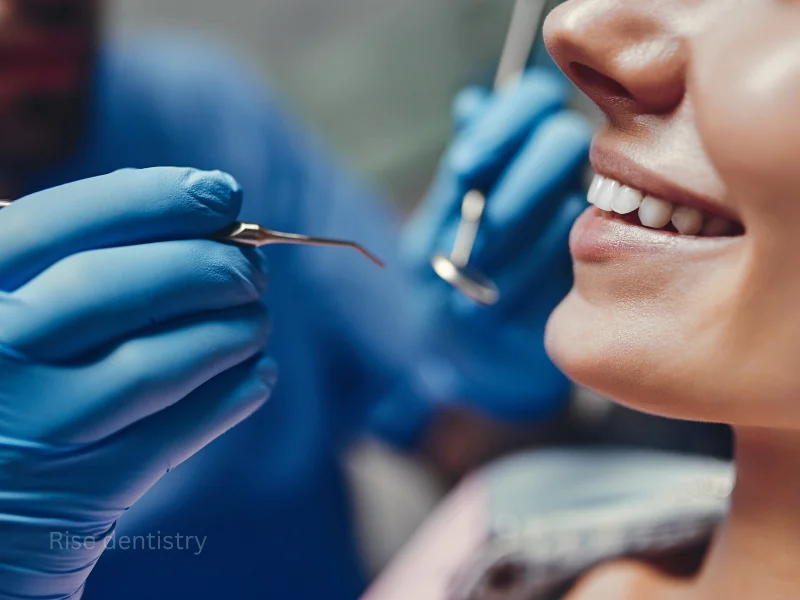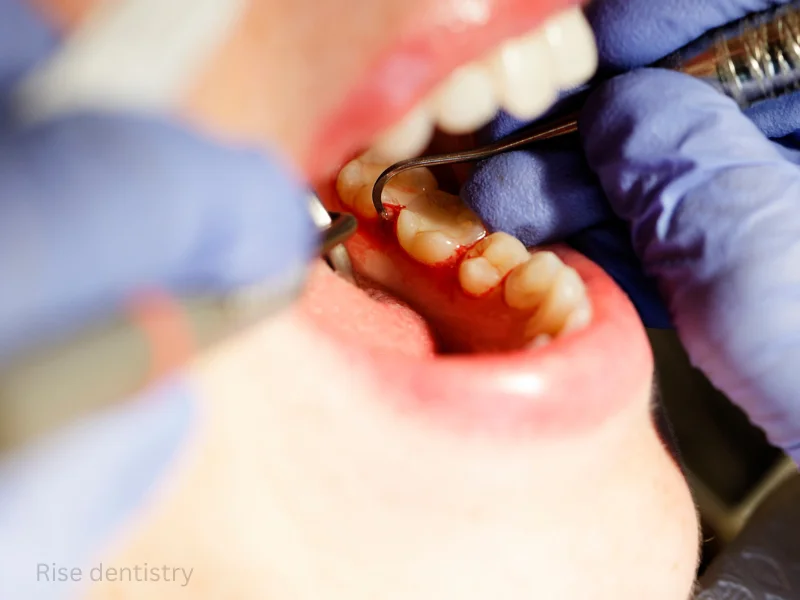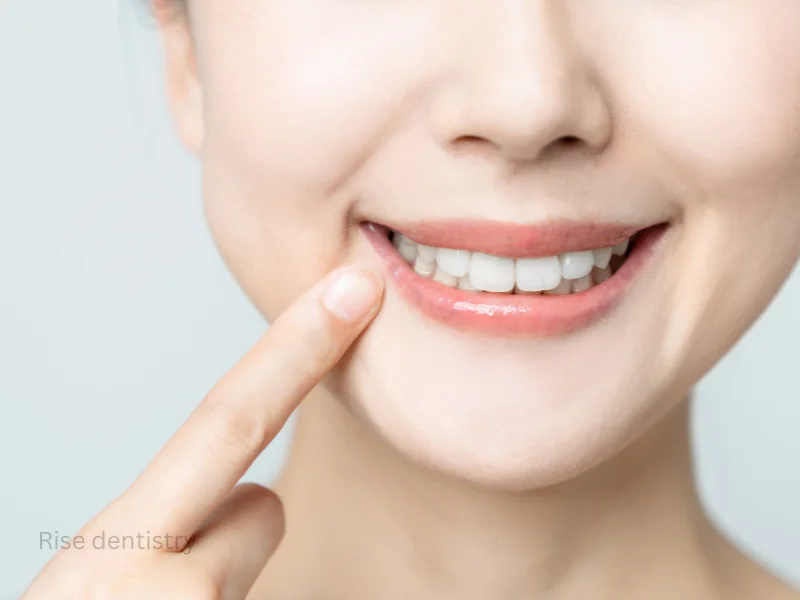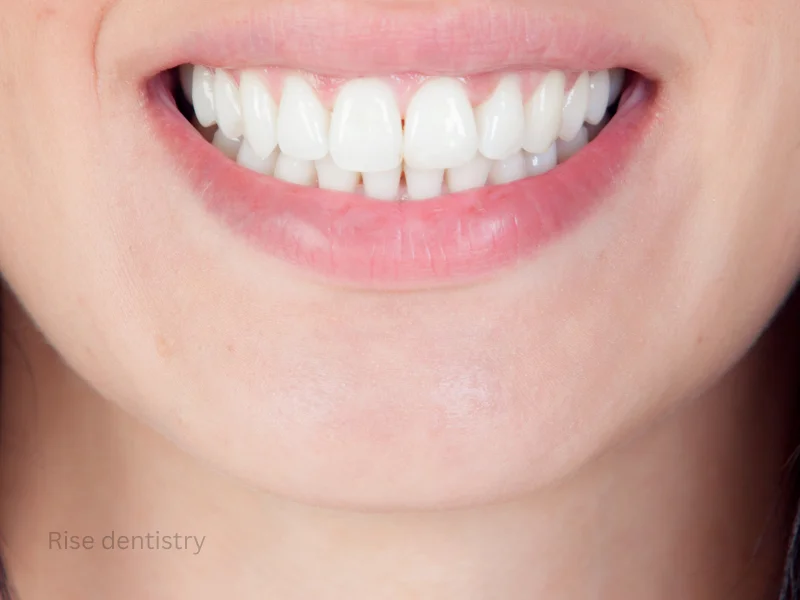
Dental cleanings may cause mild discomfort, but they’re essential for your oral health. Schedule your appointment today for a comfortable and thorough cleaning!
Many people feel anxious about dental cleanings and wonder, “Does dental cleaning hurt?” The good news is that for most people, it isn’t painful. However, if it’s been a while since your last visit or you have sensitive teeth or gum disease, you might feel some discomfort.
While discomfort can happen, it’s usually temporary. If your gums are inflamed or there’s plaque buildup, you might experience some sensitivity. But regular cleanings are essential for maintaining healthy teeth and gums, preventing bigger problems down the road.
In this post, we’ll explain what happens during a dental cleaning and why some people feel discomfort. By the end, you'll feel more confident about your next visit to Rise Dentistry.

Dental cleaning is a straightforward process, but many people wonder if it’s painful. During the cleaning, the dental hygienist removes plaque and tartar from your teeth. Plaque is a sticky layer of bacteria, and tartar is hardened plaque that only a professional can remove.
The hygienist uses a scaler to gently scrape away the plaque and tartar, especially around the gumline. Next, they may use an electric brush to polish your teeth and remove surface stains. This can feel like a light tickle, but it shouldn’t be painful.
Afterward, the hygienist flosses between your teeth and you rinse with fluoride to remove any leftover debris. Regular professional teeth cleaning is important for routine dental care to prevent cavities, gum disease, and other issues.

If you have dental cleaning sensitive teeth, the process can be uncomfortable, especially when the scaler touches exposed areas.
Gum disease causes inflammation, making the gums tender and prone to bleeding during cleaning.
When gums recede, they expose sensitive areas of the teeth, leading to more discomfort during the procedure. This often contributes to the feeling of teeth cleaning painful.
Plaque turns into tartar, which can only be removed by a professional. This buildup can cause more discomfort during the cleaning.
After the cleaning, tooth pain can occur due to the irritation of sensitive areas and inflammation.
Gums hurt after cleaning is common, especially for those with gum disease or sensitive gums. The discomfort is usually temporary.
If you’ve skipped cleanings, an intensive cleaning may be needed to remove hardened tartar, causing additional discomfort.

Many patients ask, "Should teeth cleaning hurt?" For most people, cleanings should not be painful. However, discomfort may occur due to issues like gum disease or sensitive teeth. Gum disease causes inflammation, making the gums tender and more likely to bleed. Sensitive teeth can lead to sharp pain when touched by cleaning tools.
Pain during cleanings often signals an underlying issue, such as gum recession or untreated gum infections. These conditions can make the cleaning process more uncomfortable.
If your cleaning causes pain, it's important to address these problems before your next visit. Regular dental checkups, maintaining good oral hygiene, and managing conditions like sensitive teeth and gum disease can prevent discomfort during future cleanings.

To minimize discomfort during a dental cleaning, start by maintaining good oral hygiene. Brushing and flossing regularly remove plaque and tartar, reducing the amount of scaling needed. This can make the cleaning process easier and less uncomfortable, ensuring a painless teeth cleaning experience.
If you have sensitive teeth, consider using desensitizing toothpaste. It blocks pain signals and can ease discomfort before your appointment at Rise Dentistry.
Regular dental visits are essential for preventing discomfort. Routine cleanings keep tartar buildup under control, making each cleaning less intense.
If discomfort persists, talk to your hygienist. There are professional options, like numbing gels or sedation, that can make cleanings more comfortable. Regular checkups and proper care at Rise Dentistry can ensure a more comfortable, painless teeth cleaning experience at your next visit.

Healthy gums are key to a comfortable dental cleaning. Gum disease, including gingivitis and periodontitis, can make cleanings more painful. Gingivitis causes inflammation and bleeding, while periodontitis affects deeper gum tissues, increasing pain during cleanings.
Gum recession also contributes to discomfort. As gums pull back from the teeth, they expose sensitive roots. This makes the cleaning process more uncomfortable, especially when tools touch these areas.
To reduce discomfort, it’s important to maintain healthy gums. Regular brushing and flossing can prevent gum disease and recession. Scheduling routine cleanings catch issues early, preventing pain and keeping your gums healthy.
Taking care of your gums ensures a more comfortable experience during future cleanings and protects your overall oral health.


After a dental cleaning, mild tooth pain is common, especially if there was heavy tartar buildup. The discomfort typically disappears within one to two days. If you have sensitive teeth, you may experience more sensitivity, but it should subside over time.
Your hygienist may apply fluoride treatment after the cleaning. This strengthens tooth enamel and reduces discomfort. It works by remineralizing your teeth, making them less sensitive.
After your cleaning, be gentle when brushing, especially around the gum line. Avoid cold or hot foods and cold water for a few hours to prevent irritation. If you experience pain, use desensitizing toothpaste to soothe your teeth. With proper care, any discomfort will go away quickly, leaving you with a bright, healthy smile.



Use a soft-bristled toothbrush to prevent irritation.

Consider using desensitizing toothpaste to reduce sensitivity.


Regular cleanings maintain oral health.

They prevent plaque buildup and gum disease, reducing discomfort in future cleanings.


Brush gently around the gum line to avoid irritation.

Use a mild mouth rinse to keep your mouth fresh.

Stay hydrated so your gums heal and stay healthy.


Avoid hot or cold beverages for a few hours to prevent irritation.

Steer clear of acidic foods (e.g., citrus or tomatoes), as they can cause discomfort.
If your hygienist detects signs of gum disease during a cleaning, follow up with Rise Dentistry. Early treatment can prevent complications and discomfort.
If sensitivity persists after your cleaning, it could indicate an underlying issue like gum recession or tooth decay. This shouldn’t be ignored, as it may require further treatment.
Additionally, if you experience pain that doesn’t subside or if the discomfort lasts longer than expected, it's important to consult Rise Dentistry. Persistent pain could signal a deeper issue, such as an infection or untreated cavities. It’s best to schedule a visit to address these concerns and prevent further damage. Early care will avoid more pain and costly procedures later.
After a cleaning, mild discomfort usually lasts for a day or two. If it persists longer, consult your dentist.
You can eat after a cleaning, but it's best to avoid hot, cold, or acidic foods for a few hours. These can irritate sensitive areas.
To reduce discomfort, practice good oral hygiene at home. Brush and floss regularly, and consider using desensitizing toothpaste before your cleaning.
After a cleaning, you might experience mild sensitivity or soreness. This is normal and should go away within a couple of days.
Discomfort often comes from sensitive teeth, gum disease, or gum recession. These conditions make cleanings more uncomfortable, but they can be managed.

Managing discomfort during dental cleanings starts with good oral care. Brush and floss regularly to reduce plaque buildup and avoid sensitivity. Using desensitizing toothpaste can also ease discomfort.
Remember, regular teeth cleanings are essential for maintaining overall oral health. They prevent serious issues like gum disease and cavities, making cleanings quicker and more comfortable over time.
If you're due for a cleaning, don't hesitate to schedule an appointment with Rise Dentistry. Our professional team is here to ensure you have a comfortable and pain-free experience. Book your next appointment today for a healthier, brighter smile!

EXCELLENTTrustindex verifies that the original source of the review is Google. "For years, I avoided the dentist due to my anxiety. Dr. Hassan sorathia and their team completely changed my perspective. The office has such a calming atmosphere, and the staff is compassionate and understanding. They explained every step of my treatment and made sure I was comfortable. I'm so grateful I found them and can now take care of my teeth without fear."Posted onTrustindex verifies that the original source of the review is Google. Rise was amazing! They extracted a wisdom tooth from me and the experience was completely pain free. Thank you so much!Posted onTrustindex verifies that the original source of the review is Google. I’m so grateful I found Dr. Sorathia and his wonderful staff at Rise Dentistry! From the moment I called, his office was incredibly accommodating and got me in immediately. He was professional, kind, and patient, and he truly understood my dental anxiety. I never felt rushed or pressured and he welcomed all my questions and explained each step of the process so I always knew what was happening. He made sure I understood all of my options, allowing me to make the most informed decision for my care. I left feeling comfortable, informed, and confident about my treatment. I will absolutely be returning to Dr. Sorathia and highly recommend him to anyone looking for a compassionate and thorough dentist.Posted onTrustindex verifies that the original source of the review is Google. I’m so glad I found this office! Staff is so kind and professional. They keep your comfort at the top of their priority list. Wish I had found them sooner! Can’t recommend this dentist enough!Posted onTrustindex verifies that the original source of the review is Google. Excellent Staff and Dr Sorathia very knowledgeable pleasant ambiance !Posted onTrustindex verifies that the original source of the review is Google. Had a great experience, no wait time, in and out. Everyone was friendly, informative and professional.Posted onTrustindex verifies that the original source of the review is Google. So refreshing to meet an HONEST dentist who isn’t trying to upsell you anything. Just tells you the facts doesn’t try to sway your opinion, just lays out the options based on facts and allows you to choose for yourself what works best for you. I definitely highly recommend!Posted onTrustindex verifies that the original source of the review is Google. Fantastic service! Had a bad tooth that was absolutely killing me for several days. I load going to the dentist so I don’t have a normal one. Set the appointment in the morning and got in that same day. The dentist explained saving versus extracting the tooth and 35 minutes later I was going home. He was extremely thorough and telling me what he was going to do and with the post office instructions. The staff both out front and his assistants were fantastic!! absolutely could not have asked for a better experience and he will be my dentist going forward.
© 2023-2025 Rise Dentistry. All rights reserved.